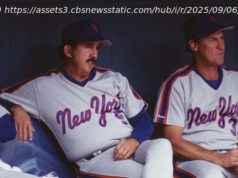A revered figure in San Francisco who hit 521 home runs in 22 seasons.
Willie McCovey, the Hall of Fame first baseman who hit 521 home runs in 22 major league seasons, almost all of them with the Giants, and remained a beloved figure in San Francisco into his final years, died on Wednesday at Stanford Hospital. He was 80 and lived in Woodside, Calif.
The Giants, who announced his death, said he had been dealing with “ongoing health issues.”
McCovey joined the Giants in 1959, their second season on the West Coast, and was a unanimous selection as the National League’s rookie of the year. He emerged as one of baseball’s greatest sluggers while battling the notorious winds at Candlestick Park. He led the league in home runs three times and in runs batted in twice and was named its most valuable player in 1969.
Known as Stretch for his 6-foot-4-inch, 200-pound frame and his long arms, McCovey was a fearsome left-handed pull hitter.
Amid all his achievements, he was also remembered for a crushing moment when he came excruciatingly close to bringing the 1962 Giants a World Series championship over the Yankees.
Although he played in only 91 games, appearing mostly in the outfield or pinch-hitting, McCovey hit 20 homers that season, when the Giants defeated the Los Angeles Dodgers in a three-game playoff to win the pennant.
The World Series came down to Game 7. McCovey, who had tripled earlier in the game, came to bat at Candlestick Park against the Yankees’ starter, Ralph Terry, in the ninth inning with runners on second and third, two outs and the Yankees leading, 1-0. He ripped the ball, but second baseman Bobby Richardson was standing in exactly the right spot and snared it chest high.
“One foot higher, or either way, and I guess I would have been a hero,” McCovey said afterward, envisioning what almost certainly would have been a dramatic 2-1 Giants victory.
That December, Charles M. Schulz voiced his sympathy for McCovey in a “Peanuts” comic strip. Charlie Brown sits, hands on chin, through three panels, then lifts his head and asks, “Why couldn’t McCovey have hit the ball just three feet higher?”
A month later, in a similar image, he lamented, “Or why couldn’t McCovey have hit the ball even two feet higher?”
McCovey would never appear in a World Series again.
“I would put Willie McCovey and Willie Stargell in the same category,” Don Sutton, the star right-handed pitcher who had faced McCovey and the Pittsburgh Pirates’ Stargell many times, told the Scripps Howard News Service when McCovey was elected to the Hall of Fame in 1986, his first year of eligibility.
“Both were so darn big and swung the bat like they were swinging a fountain pen. You couldn’t throw the ball past them, and there was no way to trick them. They scared you.”
Bill Rigney, McCovey’s first manager with the Giants, once said that he had “never seen a harder hitter,”
McCovey was overshadowed at times by his teammate Willie Mays, perhaps the greatest all-around player in baseball history. But his popularity surpassed Mays’s among many San Francisco fans, because Mays had become a star in New York but McCovey’s major league roots were in the Bay Area.
More than 30 years after his retirement, McCovey endured as a Giants presence. Although using a wheelchair, a result of numerous knee and back operations, he attended virtually every Giants home game as a senior adviser to the team.
The inlet of San Francisco Bay behind the right-field fence at AT&T Park, christened McCovey Cove, is crowded on game days with boaters competing to fetch home-run balls splashing down. A nine-foot-high bronze statue of McCovey was dedicated in 2003 at China Basin Park on the cove’s shoreline.
McCovey was honored with his fellow Giants Hall of Famers Mays, Gaylord Perry, Juan Marichal and Orlando Cepeda at the team’s AT&T Park before Game 3 of the 2014 World Series, in which the Giants defeated the Kansas City Royals in seven games. The Giants have presented a Willie Mac Award annually since 1980 to a San Francisco player exemplifying McCovey’s spirit and leadership.
Willie Lee McCovey was born in Mobile, Ala., on Jan. 10,1938, the seventh of 10 children of Frank McCovey, a railroad laborer, and his wife, Ester. An outstanding first baseman in sandlot baseball, he was signed to the New York Giants’ minor league system in 1955 and soon earned a reputation as a power hitter.
McCovey made his major league debut with a flourish on July 30,1959, when he went 4 for 4, hitting two triples and two singles off Robin Roberts, the Philadelphia Phillies’ future Hall of Fame right-hander.
McCovey played in only 52 games that season, but he hit .354 with 13 home runs and was named rookie of the year.
Many San Francisco fans regarded Mays as the symbol of New York baseball in its golden age of the 1950s, a hero of the Polo Grounds. They focused their adulation on McCovey and the slugging Cepeda, who switched to the outfield to make room for McCovey at first base. They were local heroes in the pioneering years of major league baseball on the West Coast, with the Giants in San Francisco and the Brooklyn Dodgers having moved to Los Angeles.
McCovey tied Hank Aaron as the N. L.’s home run leader in 1963 with 44, which coincidentally was also both men’s jersey number. (McCovey had chosen the number to honor Aaron, a fellow Mobile native.) He had 36 homers and 105 R. B. I. in 1968, and 45 homers and 126 R. B. I. in 1969, leading the league in both categories each of those seasons. He hit.320 in 1969, when he won most valuable player honors.
McCovey hit a pair of homers in the 1971 N. L. Championship Series, in which the Giants were defeated by the Pittsburgh Pirates, but by then age and injuries were beginning to take their toll. He was traded to the San Diego Padres after the 1973 season and played with them until late in 1976, when he was purchased by the Oakland A’s and appeared in 11 games as a designated hitter and pinch-hitter.
He rejoined the Giants the next season at age 39 after declaring himself a free agent and played for them through 1980, retiring as a four-decade player. Playing mostly at first base, he had a.270 career batting average, 2,211 hits and 1,555 R. B. I. to go with his 521 home runs, 18 of them grand slams, all hit in the N. L. He is in a three-way tie for 20th place on the career homers list, along with Ted Williams and Frank Thomas.
“People ask me how I’d like to be remembered,” McCovey once told The Associated Press.
“I tell them I’d like to be remembered as the guy who hit the line drive over Bobby Richardson’s head,” he said, jokingly recalling the World Series-winning hit that wasn’t.
McCovey was back in the public eye on a somber note in June 1995. Reliant on a cane, a result of his orthopedic ailments, he appeared in United States District Court in Brooklyn together with the Dodgers’ Hall of Fame center fielder Duke Snider; both men pleaded guilty to tax fraud charges for failing to report tens of thousands of dollars received in fees from autograph shows.






